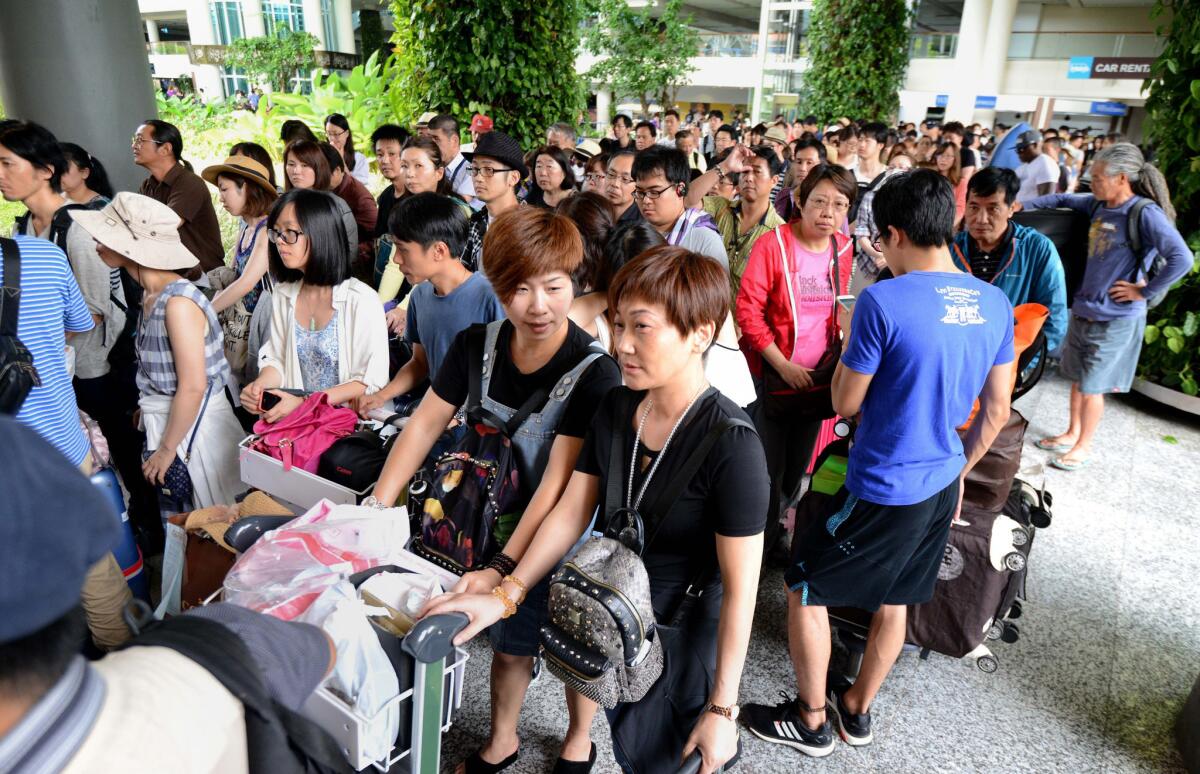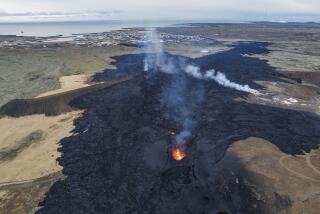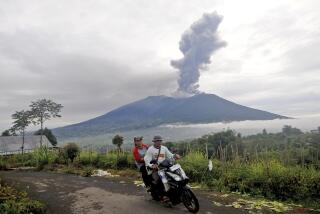Indonesia volcano erupts, sparks travel chaos

Passengers crowd the international terminal at Bali’s Ngurah Rai airport in Denpasar after a volcano eruption canceled flights on July 10.
- Share via
reporting from JAKARTA, Indonesia — Ash spewing from a volcano on Indonesia’s main island of Java has sparked chaos for holiday travelers as airports close and international airlines cancel flights to tourist hotspot Bali, stranding thousands.
Mt. Raung in East Java province about 93 miles from Bali’s international airport has been rumbling for several weeks. The level of activity increased in the past week, and on Friday it blasted ash and debris 12,460 feet into the air.
Government volcanologist Gede Suantika said the eruption forced authorities to close five airports due to the risks posed by volcanic ash, though two airports on Lombok Island reopened Friday afternoon. The Transport Ministry has told airlines to avoid routes near the mountain. It said a decision about reopening other airports will be made by early evening Friday.
Suantika said lava and ash fall from the 10,930-foot mountain on Indonesia’s most densely populated island has also resulted in the government calling on people to stay away from a two-mile high-danger zone around the volcano.
Evacuation of residents living near the volcano is still considered unnecessary, but authorities are urging people to wear protective face masks.
Volcanic eruptions can cause significant and lengthy disruption to travel. A 2010 eruption of Iceland’s Eyjafjallajokul volcano produced an ash cloud that caused a week of international aviation chaos, with more than 100,000 flights canceled.
“Ash can clog engines and harm other parts of the aircraft,” said Transport Ministry spokesman Julius Adravida Barata.
Airports on the islands of Bali and Lombok as well as airports at Banyuwangi and Jember in East Java were closed late Thursday. Barata said thousands of travelers are stranded.
Flights within Indonesia were already overbooked as tens of millions of the country’s Muslims pour out of major cities to return to their villages during an annual mass exodus to celebrate the end of the Islamic holy month of Ramadan.
The volcano has proved particularly problematic for Australians, who flock to Bali during Australia’s school holidays.
Dozens of flights between Australia and Bali’s Ngurah Rai airport by Australian carriers Jetstar and Virgin Australia have been canceled over the past week, with the airlines citing safety concerns.
Both carriers said they are looking into adding extra flights between Australia and Bali when conditions improve to help clear the backlog.
At Bali’s international airport, some tourists slept on benches or stood at flight information boards filled with “postponed” and “delayed” notifications. Some complained of a lack of information about their delayed flights.
“The airline can’t tell us if we’re going to be here tonight or fly tomorrow or the next day,” said Charmaine Scott, an Australian holiday traveler.
“This is really difficult for us. We have to basically find some way to stay.”
She said that she and her husband hadn’t heard about the eruption and flight cancelations until they arrived at the airport Friday morning.
Raung is among about 130 active volcanoes in Indonesia. The archipelago is prone to volcanic eruptions and earthquakes because of its location on the Pacific “Ring of Fire,” a series of fault lines stretching from the Western Hemisphere through Japan and Southeast Asia.
Another Indonesian volcano, Mt. Sinabung in Sumatra, has been erupting for two months, forcing the evacuation of more than 10,000 people.
More to Read
Sign up for Essential California
The most important California stories and recommendations in your inbox every morning.
You may occasionally receive promotional content from the Los Angeles Times.













